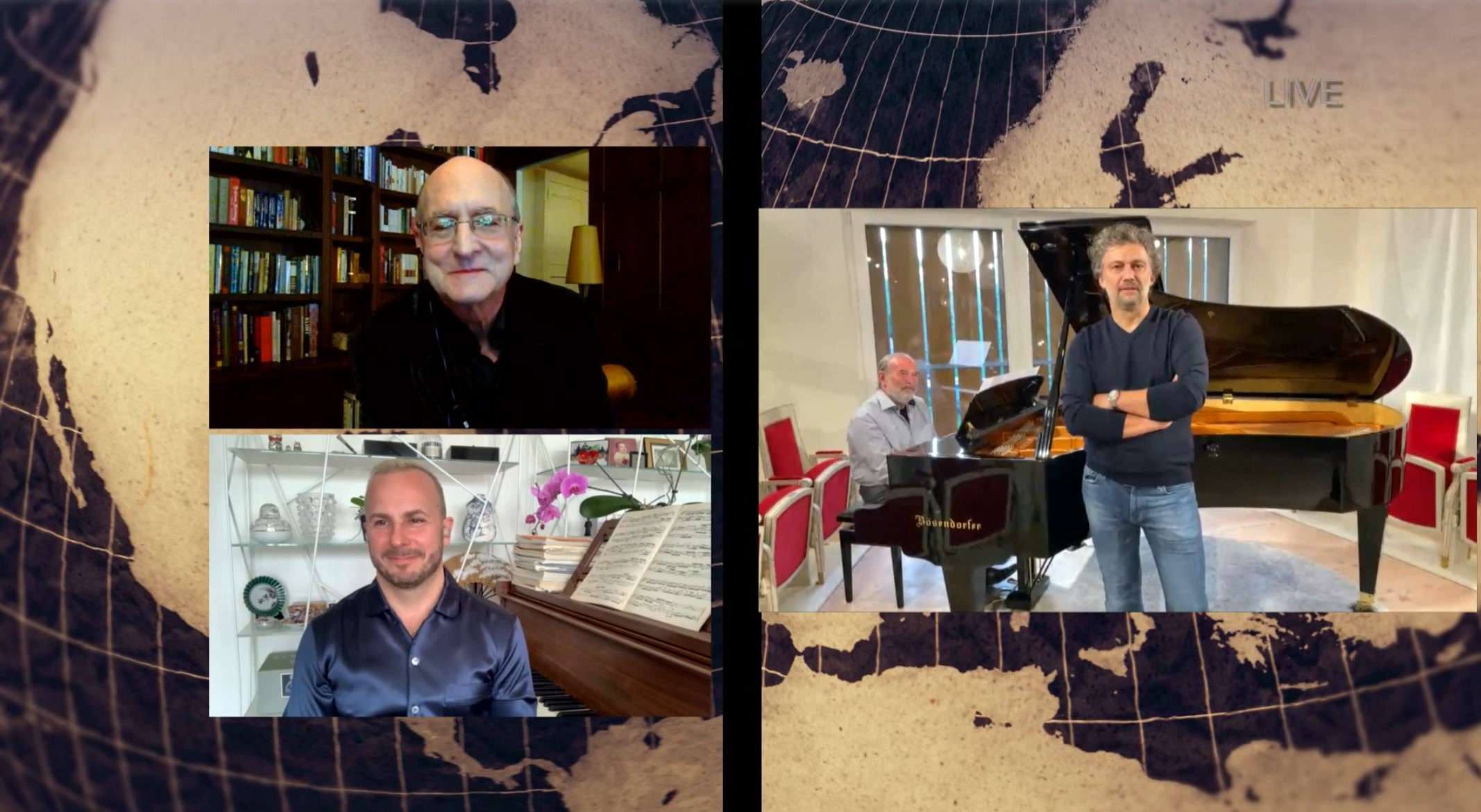
What the Met's At-Home Gala teaches us about evolution
Op-EdThe Metropolitan Opera has been home to plenty of history over its lifespan, and today is another for the books. Over 40 of the Met’s artists banded together - via Skype - to create the At-Home Gala, a four-hour marathon of performances given from everyone’s respective homes. Those 40+ don’t account for the performances by the Met Orchestra and the Met Chorus, which were prerecorded for the occasion; some big kudos should go to the Met staff who organized all of this, because despite all the moving parts, the (nearly) all live event went smoothly.
It was admittedly a bit weird at times. Weird to see Jonas Kaufmann sing in jeans. Weird to watch Elīna Garanča use her bookcase as a sexy Habañera set piece. What was the story behind the strange bust sitting on the piano behind Anthony Roth Costanzo? Joseph Calleja standing stage-right of a big fish tank? And for some reason I am spending a lot of time wondering about the mystery item laying askew on Matthew Polenzani’s couch.
But for a snoopy snoop like me, there were serious moments of charm with the At-Home Gala. We got little glimpses into these people’s worlds - curated and tidied up for the festivities, I’m sure. Renée Fleming’s airy living room, Nadine Sierra’s foliage-filled space, and the delish kitchen of Diana Damrau and Nicolas Testé. It was fascinating to see which of these stage animals relish the virtual medium - not all of them did, I surmise.
It’s a shame that she gave us something pre-recorded and all about Anna, without a whiff of the home-performance charm, and still managed to situate herself as a grand finale.
Now is no time to look down on feats like this one, because it really was an amazing thing to witness. I wonder about a few things, though. Did the Met consider making this a ticketed event? It wasn’t technically a fundraiser, but the “donate” button was ubiquitous - and that’s understandable. I bet people would have paid for something like this, and the imperiled company could pocket a bit of fundraising - or even (and here goes one of the more naïve things I’ve ever written) send the money back to the participating artists.
And speaking of the participating artists - I wonder very loudly how they felt about doing this for no fee, particularly those who found out about their cancelled Met contracts through social media posts. It’s quite something for General Manager Peter Gelb to not call his contracted artists when COVID-19 shut everything down, and then ask them to come help “Save The Met” with a free performance at home. Yikes.

I’m not sure that the Met meant to reveal itself in this particular way, but I came away from this gala with a fresh understanding of what kind of opera will survive after all of this calms down. It won’t be the kind of opera where people gaze off into some random distance, trying to emote depth when really they just look disingenuous. It won’t be the kind of opera where we are hollered at through unnerving virtual eye-contact, or the kind where dramatic duets are staged on the confines of a piano bench. And I’m sorry, it won’t be the kind of opera that Anna Netrebko gives us. She’s definitely a big draw and I’m sure people were itching to hear her; it’s a shame that she gave us something pre-recorded and all about Anna, without a whiff of the home-performance charm, and still managed to situate herself as a grand finale.
It may feel right now like these singers need the Met in order to continue their careers after all of this is behind us.
Star power is something that absolutely is transferable from stage to screen. Soprano Erin Morley gave us a damn show - she accompanied herself doing “Chacun le sait” from Le fille du régiment, and gave us something impressive, elastic, and ending with an ovation-worthy high F. René Pape made a damn connection - he’s got that Alec Baldwin-y charisma about him, and delivered Sarastro’s first aria from The Magic Flute like some sort of storytelling elder. Angel Blue, Ildar Abdrazakov, Nadine Sierra, Lisette Oropesa, Javier Camarena, all delightful. These are artists who can perform at an extraordinarily high level all the time, while remembering that this whole thing is all about entertainment.
The performing arts industry is one that will absolutely survive this pandemic, but only if it is willing to bend, adapt, and evolve. I don’t easily equate those traits with The Metropolitan Opera, but this gala certainly reminded me that the artists who sometimes sing on the stages of the Met are another thing entirely. That goes, too, for the musicians of the Met Orchestra and the singers of the Met Chorus - and certainly for music director Yannick Nézet-Séguin, whose magnetic energy is palpable even virtually.
It may feel right now like these singers, their calendars and incomes slashed without an end in sight, need the Met in order to continue their careers after all of this is behind us. But I think it’s the other way around; if the Met manages to pick itself back up, it will absolutely need these artists - these adaptive, generous artists - to survive. I hope Gelb and his crew really understand that.


Comments